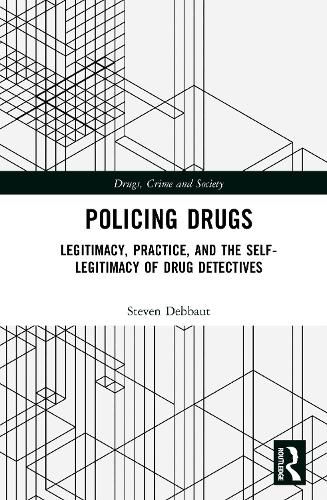Readings Newsletter
Become a Readings Member to make your shopping experience even easier.
Sign in or sign up for free!
You’re not far away from qualifying for FREE standard shipping within Australia
You’ve qualified for FREE standard shipping within Australia
The cart is loading…






Exploring the complex interplay between drug law enforcement and self-legitimacy among police officers, this book, through ten months of ethnographic research in Belgian cities, examines how drug detectives justify their role within a challenging landscape of moral, social, and legal dilemmas.
Chapters cover key theoretical frameworks, including self-legitimacy, moral philosophy, and policing culture, alongside detailed interviews and field observations. Readers gain insight into the motivations and ethical conflicts that shape policing practices, revealing how officers navigate societal expectations, the symbolic 'war on drugs', and their own sense of moral duty. Its insights into the 'eradicative' versus 'sanitorial' drug discourse provide valuable perspectives on how enforcement strategies are informed by underlying social and cultural beliefs. By analysing how detectives confront the limits of punitive approaches, this study encourages a re-evaluation of current drug policies and their effectiveness, offering a nuanced view of the realities of drug policing in contemporary society.
Policing Drugs: Legitimacy, Practice, and the Self-Legitimacy of Drug Detectives is ideal for scholars, policymakers, and law enforcement professionals interested in criminal justice, drug policy, and police ethics.
$9.00 standard shipping within Australia
FREE standard shipping within Australia for orders over $100.00
Express & International shipping calculated at checkout
Exploring the complex interplay between drug law enforcement and self-legitimacy among police officers, this book, through ten months of ethnographic research in Belgian cities, examines how drug detectives justify their role within a challenging landscape of moral, social, and legal dilemmas.
Chapters cover key theoretical frameworks, including self-legitimacy, moral philosophy, and policing culture, alongside detailed interviews and field observations. Readers gain insight into the motivations and ethical conflicts that shape policing practices, revealing how officers navigate societal expectations, the symbolic 'war on drugs', and their own sense of moral duty. Its insights into the 'eradicative' versus 'sanitorial' drug discourse provide valuable perspectives on how enforcement strategies are informed by underlying social and cultural beliefs. By analysing how detectives confront the limits of punitive approaches, this study encourages a re-evaluation of current drug policies and their effectiveness, offering a nuanced view of the realities of drug policing in contemporary society.
Policing Drugs: Legitimacy, Practice, and the Self-Legitimacy of Drug Detectives is ideal for scholars, policymakers, and law enforcement professionals interested in criminal justice, drug policy, and police ethics.